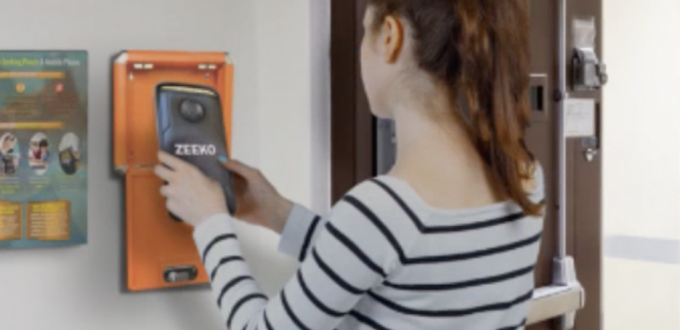-
In 2023, a UK school was forced to call the fire brigade after a student’s phone overheated and caught fire in class, underscoring the dangers of lithium-ion failures in education settings (Education Forum – The Rising Risk of Lithium-ion Battery Fires in Schools).
-
UK fire data shows lithium-ion battery fires rose 46% between 2022 and 2023, with schools highlighted as high-risk environments for small electronics.
-
The Dublin Fire Brigade has issued repeated public warnings about the dangers of lithium-ion battery fires in e-scooters and e-bikes, noting how quickly these fires spread and how difficult they are to extinguish (Dublin Fire Brigade – Official Warnings). While these warnings focus on transport devices, the same lithium-ion battery technology is used in mobile phones, making the risks directly relevant in school environments.
-
Aircraft incidents also highlight the danger: a Qantas flight experienced a smoking phone after it was crushed in a seat mechanism; crew contained the incident (ABC News). A Virgin Australia flight had a mid-air locker fire believed to be caused by a lithium-ion power bank; crew used extinguishers and landed safely (The Guardian).
Frequently Asked Questions
1. How do phone pouches support the Stop Block Tell approach?
Zeeko Phone Pouches support Stop Block Tell by physically removing distractions (Stop), preventing unauthorised access and communication (Block), and encouraging students to seek help from trusted adults (Tell) when issues arise. Together, they reinforce responsible digital behaviour in schools.
2. Why is security an important feature when choosing phone pouches for schools?
Strong security ensures that phones remain inaccessible during the school day, supporting mobile phone policies and the principles behind Stop Block Tell. Secure, tamper-resistant locks help schools maintain focus and reduce misuse without putting students at risk.
3. Are phone pouch locking systems safe for students?
Yes—when designed correctly. High-quality phone pouches avoid exposed pins or sharp components that could cause injury. Safe locking systems align with EU safety standards and reflect Zeeko’s commitment to student wellbeing and safety-first implementation.
4. How long should phone pouches last in a school environment?
Phone pouches should be built for daily use in busy school settings. Durable, military-grade materials with reinforced stitching offer longer lifespans, better value, and fewer disruptions—making them a more sustainable solution over multiple school years.
5. Do phone pouches fully block mobile, Wi-Fi, and Bluetooth signals?
Effective phone pouches should fully block mobile, Wi-Fi, and Bluetooth signals using tested shielding materials. This ensures students cannot bypass school policies using smartwatches or wireless accessories, supporting the Block element of Stop Block Tell.
6. Why is full signal blocking important in schools?
Partial signal blocking can still allow distractions and misuse. Full signal isolation ensures a focused learning environment, prevents circumvention of rules, and reinforces clear boundaries around device use.
7. How are phone pouches unlocked at the end of the school day?
Zeeko Phone Pouches use fast, secure unlocking systems operated by staff using handheld or wall-mounted devices. This allows large groups of students to unlock their phones quickly and safely at dismissal time.
8. Can phone pouches be unlocked during lessons if phones are needed for learning?
Yes. Schools can install wall-mounted unlocking devices in classrooms, allowing teachers to unlock pouches for specific lessons when phones are required. This supports learning while maintaining control and accountability.
9. How can schools implement phone pouches smoothly?
Successful implementation involves more than purchasing pouches. Schools benefit from:
-
Staff training
-
Policy templates
-
Parent communication resources
-
Classroom guidance materials
This structured approach aligns with Zeeko’s educational focus and the Tell aspect of Stop Block Tell—clear communication and shared understanding.
10. Are phone pouches fire-resistant?
High-quality phone pouches should comply with recognised fire safety standards such as DIN EN ISO 15025. Fire-resistant materials reduce risks associated with lithium-ion battery failures and add an important layer of protection in schools.
11. Why is fire resistance important in phone pouches?
Although rare, lithium-ion battery fires can occur. Fire-resistant phone pouches help contain potential incidents, protect students and staff, and ensure schools meet health and safety obligations.
12. Do Zeeko Phone Pouches comply with Irish and EU regulations?
Yes. Phone pouches should comply with:
-
General Product Safety Regulation (EU) 2023/988
-
REACH Regulation (EC) 1907/2006
-
Relevant fire safety and environmental standards
Compliance ensures products are safe, non-toxic, and suitable for use in Irish schools.
13. Why should schools choose an Irish supplier for phone pouches?
Partnering with an Irish supplier ensures:
-
Alignment with Department of Education policies
-
Easier communication and accountability
-
Local training and support
This makes policy roll-out smoother and more sustainable for schools.
14. Is funding available to help schools purchase phone pouches?
Yes. Under Department of Education Circular 0045/2025, funding has been allocated to support post-primary schools in purchasing mobile phone storage solutions, including locking pouches. Funding is issued based on application timelines set out in Circular 0046/2025.
15. Who are Zeeko and how do they support schools?
Zeeko is an Irish education company that combines technology with education. With experience delivering internet safety training to over 100,000 students nationwide, Zeeko’s phone pouch system supports schools in managing phone use while promoting the values behind Stop Block Tell—safety, responsibility, and wellbeing.
Explore Zeeko’s Home Page to discover our mission on the About Us Page, innovative Phone Blocking System, and engaging Phoenix Quest 10 programme. We provide Internet Safety Seminars, the Zeeko Report Card, and the Magical Leaders Choose Country initiative, alongside insights from our Digital Trend Report. Stay connected with us on Facebook and Instagram for updates.

